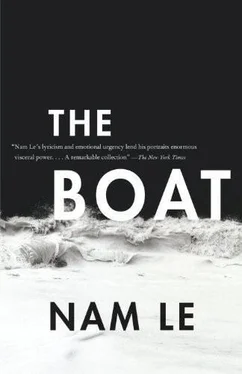He took her to a seafood bistro near Seven Corners where even the water smelled like mussels. They ordered crabs. Paul rolled up his sleeves and broke open a pincer, his fingers with their perfect square nails glistening in the meat's steam. She found herself transfixed as he slurped the wet flesh. As though to hold up her end of the deal, she tried to eat sexily — imitating the way women on TV pursed their lips, leaving the tip of each morsel visible — but ended up dripping grease down her chin and forearms and onto her blouse. He didn't notice, or seem to. They went on to a small jazz club in an Irvington brownstone that looked, from the outside, like a B&B. The music, breathless and wheezy, mixed with the alcohol, and, when he righted his chair away from her and leaned toward the band, wrists on his knees, his expression almost narcotic in its concentration, she shocked herself by arching over and kissing him on the side of his neck. He turned to her with a look of surprise.
The door of his apartment was cold and hard against her back. She popped up on her toes. His hands were all over her body now. It was dark. He reached under her shirt and pulled it up, over her face. She tilted her head back. The collar caught under her chin. He kissed her through the fabric, roughly, the taste of his mouth salty with the taste of her body. She felt heavy in her legs. The metal of his belt buckle shocking her skin.
"I can't stay," she said.
"I'll stop," he murmured, somewhere around her navel. His fists were tight on her waistband, tugging.
"No." She reached down and outlined his shoulders, tense with exertion. His tendoned neck. "I mean, I've got a brief due tomorrow." For a moment everything was suspended but the words, the image of her keyboard blue-lit by her screensaver. Why had she said that? He continued below in the darkness. Maybe she hadn't said it aloud. She lifted her legs one by one. "Turn around," he ordered.
She turned around. The air was cold against her bare skin but still she felt woozy with warmth. The music from the jazz club banged around in her head. She had never done this. She had never turned around like that. She was a girl who'd always undressed under the covers and now she was naked in the hallway of an unknown apartment with a man she barely knew behind her.
"Wider."
From an adjoining apartment a telephone started ringing. She heard him undo his buckle, unzip. She could feel the heat of him, her body nervous with want. He spat into his hands and slick-ened her. A shudder ran through her, was forced from her mouth as noise.
"Wider."
Someone answered the phone, a muffled, stale inflection in counterpoint to his spongy breathing. His wet hands gripping her hip bones. His fingernails. All of a sudden she needed to see him. She needed to see his face. She twisted around and looked at his face. It was creased in anger — his eyes closed — a snarl on his lips. She bit back a cry. She didn't know him. This man who was fucking her. Then she looked again, closely, and realized the look on his face wasn't anger at all.
He was gone when she awoke. The room grown strange in its size, the white glow through the shutters. Except where her body had lain the bed was cold. Stupid , she thought, Stupid, stupid, stupid . The secretaries would have a field day. Why was she thinking about the secretaries? Stupid ! She got up, squinting in the dim burn from the windows. Then she saw them — her clothes — neatly folded in a chair. The bastard. Later, she would tell him it was preposterous to think a woman wouldn't interpret the scene as she had. She dressed quickly, quietly, as though under orders. By the time she'd finished she was so shaken that when, on her way out, she saw him at the kitchen counter, still in his boxers, pen in hand, correcting her brief in the light from an open fridge; when he called her name and she heard how it sounded on his lips, it was unfair-an unconscionable situation- because she'd been rendered wholly susceptible and was no longer in any state to resist.
The air-conditioning unit clicked twice, made a rattling sound, whined off. Sarah tried it again, then gave up. She lay down on the bed. The sheets were cool, the pillowcases so starched they creased like cardboard. The shadows thrown by the tree boughs against her skin looked like the written language here: half-open mouths, fishhooks, sickle blades, pregnant letters with dots in their bellies. An alphabet refracted in water. She closed her eyes. Again, the faint thud of drums. After a while- unable to sleep-she got up and turned the bath spigot, conscious of the waste but past caring, letting the water run as white noise.
THE PHONE RANG. Sarah woke up — how long had she been asleep? — into an awful smell: like fruit gone bad, sink water left too long. She struggled to place herself inside it. No one answered when she picked up the receiver, the only sound a faint hum of song. The sun was high outside. She realized now: the smell had worried her since she'd first arrived in Tehran — suppurating as though from some open wound beneath the city.
Three short knocks at the door. She floundered up.
"It's you!" exclaimed Parvin in a hoarse voice, lunging her arms around Sarah's neck. "You made it!" Sarah held on to her, startled by the force of her own relief. They both pulled back. It was disconcerting to see Parvin's face cropped by the black scarf.
"Oh, Sarah." Parvin, smiling steadfastly, seemed on the verge of saying any number of things, but said nothing.
"What's going on?" asked Sarah. "Why can't I stay with you?"
Parvin glanced behind her. In the hallway was Mahmoud, wearing dark slacks with a white shirt buttoned up to his Adam's apple. He looked fleetingly at Sarah, then shuffled his body completely around.
"He told you that?" Parvin lowered her voice: "It was just a precaution."
"A precaution against what?"
Parvin hesitated. "There have been a few arrests." She sidestepped Sarah into the room. "But they tend to crack down during religious holidays. My God, it stinks in here." She swung around. "No — I'll tell you all about it, but right now" — she waved with both hands — "go get your things. We're late."
Sarah dashed into the bathroom. She would save her questions. In the bathtub, the water was cloudy, tinged with mineral colors. She turned off the faucet and suddenly the sound of the outside world flooded in: drumbeats, unmistakable, in every distance, cymbals, the occasional flare of an amplified voice. She thought she heard children's footsteps.
"Sarah!"
The din on the street was astonishing. Noise collected and chafed, it seemed, in the folds of fabric next to her ears. The sky was white, overcast, and beneath it wind gusted, fitfully, as if trapped. They were going to her parents' house for a meeting, Parvin shouted, but first she wanted Sarah to see this. They turned into a chaotic market: shop after shop spilling wares onto the road — hats, shirts and shoes, electronic gadgets that blared a cacophony of tones and trills as they walked past. Sidewalk barrows were packed with green plums and big yellow limes and red-black mulberries, with dates, raisins, and nuts of every description. The dull sheen of the sunlight heightened and contrasted the rows of colors.
Parvin turned toward her. "I'm so glad you came," she called out.
Sarah grinned. For the first time since landing she felt completely safe. She was still taking note of the new heft of Parvin's body underneath her robe, the untidy fringe of brown hair — her natural color! — underneath the hair-clipped scarf. Even her eyes seemed more naturally brown. She looked like a rougher, truer version of herself.
"Where were you this morning?" Sarah asked.
Parvin held up her hand. They rounded another corner and abruptly the air turned thick with deep-throated cries, the crash of cymbals. A mourning procession. It looked, Sarah was stunned to see, exactly how it looked on newsreels: young men straight-backed behind enormous drums; behind them, moving in block step, men clapping their chests, throwing iron chains over their shoulders like dinner jackets. They were all bearded; all — she thought with reflexive guilt — indistinguishable from one another. Men in loose black robes and green headbands. Men with tunics open to their navels. Men naked above the waist-their backs swollen, flayed, slug-shiny in the light.
Читать дальше











